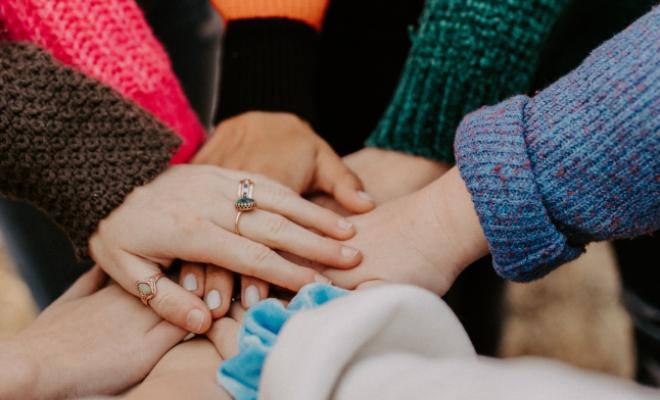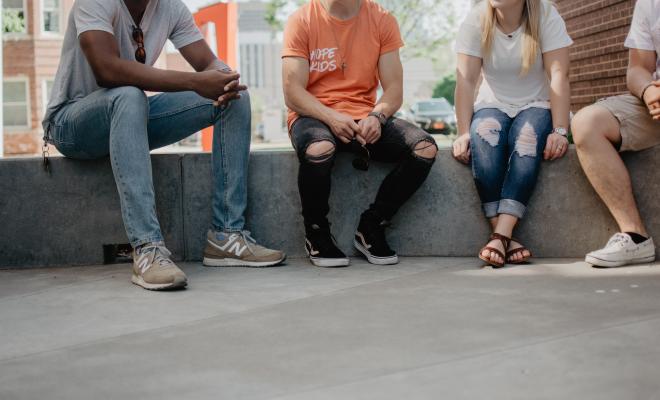15 Dec 2023
What is a local action group?
Friends of the Earth England, Wales and Northern Ireland has hundreds of local action groups around the country. We're the largest grassroots environmental campaigning community in the UK.
These groups are run by thousands of volunteers from all backgrounds, including teachers, nurses, lawyers, students, farmers, grandparents and more.
Local action groups must have at least 5 members in England, or 3 members in Wales and Northern Ireland.
What do local action groups do?
Local action groups bring people together to improve their local surroundings, and challenge unjust proposals.
Never doubt that a small group of thoughtful, committed citizens can change the world; indeed it is the only thing that ever has
Margaret Mead
Local action groups campaign on one or more issues, putting pressure on decision-makers to create change for a safer climate and fair and just world. These can be local issues like stopping old-growth trees from being chopped down or improving local air quality, national ones, like joining Friends of the Earth's United for Warm Homes campaign, or even global issues, like demanding protection for climate refugees.
Members meet regularly to plan tactics and activities that will help them reach their goal. Examples include:
- Holding stalls at local markets to gather petition signatures and recruit new members.
- Organising film screenings to raise awareness and move its community to take collective action.
- Organising a demonstration outside its councillor’s office to hold them to account for improving environment and climate goals.
- Meeting with local politicians to ask them to pledge support for their campaign.
- Organise a photo opportunity to get media and social media coverage on a local issue the group is campaigning on.
Many groups run local projects, such as tree plantings, litter collections and composting. While this isn’t the core purpose for groups, it’s a great way to connect with members of the community who aren’t involved and to make a positive impact within the area.
Local action groups also often work with other groups in their community. We have more strength to win change when we work together. Building alliances with groups who share our values is an important part of this.
Local action groups have a lot of fun. Joining a group is a great way to meet like-minded people who want to make things happen while having a good time.
What are the benefits of a local action group?
Being a Friends of the Earth local action group has numerous benefits. Some of these are:
- support, training, events, materials and resources from Friends of the Earth
- a legal structure
- public liability insurance
- access to funding
- being a part of our governance and helping shape the direction of our movement
- connected to a well-known brand name
- part of a powerful grassroots network and international movement
Who can join a local action group and what is the time commitment?
Anyone over the age of 18 is welcome to join a Friends of the Earth local action group. Under 18s need to be accompanied by an adult.
The time you commit is entirely up to you. Turn up to every meeting or pitch in sometimes.
You don’t need to be an expert in everything from policies to environmental science – a passion for justice, any skills or knowledge is always appreciated.
What is a local action group coordinator?
Each group has at least one coordinator who is the point of contact for Friends of the Earth staff. They will receive updates on campaigns and keep us updated on the group. They'll also pass on information to the rest of the group.
Local action groups are welcome to and encouraged to have more than one coordinators. Some very successful local action groups have one person in charge of internal communication and another for any outward-facing communication, including with Friends of the Earth staff.
How big are local action groups and how are they structured?
Local action groups range considerably in size – there's a no “one-size fits all” approach. Some groups have hundreds of members and their own offices, such as Birmingham Friends of the Earth. Others are much smaller but just as active.
Some groups have higher turnover than others, with people joining and leaving as time goes on. There are likely to be different levels of involvement within a group, including:
- a stronger core of 3-5 highly committed people
- those engaged only in certain activities
- and others who might just be on the mailing list
That's a perfectly healthy group, and you'll need all these people.
There needs to be at least one coordinator but we encourage groups to have 2 coordinators. But the rest is really up to the group. Some will have a treasurer, and some will also have a media contact. You might also want to allocate more roles depending on peoples' skills, such as a social media coordinator, a photographer, an event planner, etc.
An example group could look like:
- 2 group coordinators. 1 coordinator is responsible for liaising with Friends of the Earth staff, the other coordinator is responsible for organising monthly meetings. Together they write material for the mailing list.
- 1 group admin role. This person shares meeting agendas and notes with the group and ensures all group members’ contact information is up to date.
- 2 welcome buddies. These members call newcomers and welcome them to the group. They're there to answer any questions and follow up with the newcomers after meetings and events.
- 1 policy coordinator. A lot of environmental campaigning revolves around understanding complex policies. The policy coordinator could write short briefings to demystify the jargon.
- 1 events coordinator. This role manages events, such as booking, promotion, risk assessments and more.
- 1 social media coordinator. This role creates social media posts to support for the group’s campaigning and events.
This is just one example of how a group can be structured. Group structure really depends on who’s in your group, what everyone likes to do and how much time they can commit. Some groups have a very tight structure, whilst other groups share roles on a rotating process.
What does Friends of the Earth expect from its local action groups?
Friends of the Earth groups determine their own activities and work on campaigns that embrace our goal.
They should support the work and vision of Friends of the Earth by taking part in national campaigns and are free to also choose to work on a local or otherwise relevant issue.
Any work carried out by groups must adhere to the terms set out in the local action group charter which governs the relationship between groups and Friends of the Earth.
Groups are expected to campaign. There's many ways to campaign and we believe anything that leads to systemic change and builds collective power is campaigning.
Ways groups can campaign:
- Create a petition (paper or digital).
- Lobby your MP.
- Build a relationship with your MP.
- Write letters to the local media calling for support.
- Stage a demonstration or protest outside a business headquarters.
- Get your community to write letters to a business or corporation.
- Legal and non-violent protest.
- Recruit and retain new members to your group.
- Build an alliance or join a coalition of local community groups.
- Craftivism such as the community quilt making for the United for Warm Homes Day of Action.
Campaigning doesn't necessarily need to focus on political power only, however we do need to acknowledge that most of the decisions made about the environment and climate happen at the Westminster level. At times, political lobbying may be required to advance your campaign’s goals. What’s important is that you can see an issue within your community and build a campaign plan with a vision that’s long-lasting. Friends of the Earth regional staff can help you to develop that plan, build the power you need to win.
Practical projects are a great way to get politicians and local decision-makers involved in your activities. If you follow the rules on political impartiality, asking a local MP to come along to a litter pick or tree planting activity is a way to build a relationship with them, and you could use the opportunity to ask them to sign a pledge to support your campaign.
Working with people to change their local environment (such as planting more trees or clearing away litter) is a way to start conversations about the need for more systemic changes (such as budget, legislation and action from local or national governments) to create a bigger change.
How much experience do I need to be part of a group or start one?
None. What’s important is that you care about the environment, climate and justice and want to make a difference.
It helps if you've already been part of another community, faith-based, or university group because you'll know a bit more about what makes it successful.
But you can also learn "on the job." Groups need people with a whole range of skills.
Friends of the Earth regional staff will also help you to develop your skills. We provide a range of training for campaigning and community organising skills, along with 1-2-1 mentoring and coaching.
How much does it cost?
This depends on what the group would like to get up to. The group will need some regular income to pay for expenses, whether it's to pay for food at meetings or organise a big event. Some groups have membership fees to ensure a steady source of money comes in, others rely on donations. It's always helpful to run fundraising events too. If needed, groups can also apply for a grant of up to £500 from Friends of the Earth.



